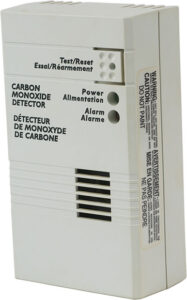
This winter the Illinois Office of the State Fire Marshal (OSFM) is stepping up its efforts to raise awareness about fire safety as well as the danger of carbon monoxide poisoning.
Be proactive and check batteries on the carbon monoxide detectors to make sure they will work when needed. Don’t let this silent killer take the lives of your loved ones. CO alarms save lives.
The Illinois Carbon Monoxide Detector Act, adopted in 2007, requires the installation of carbon monoxide alarms in every dwelling unit, with at least one working CO alarm within 15 feet of every room used for sleeping purposes.
Carbon monoxide is an odorless, tasteless and invisible gas that can be deadly when high levels are inhaled. The noxious gas is produced due to faulty or poorly repaired appliances such as furnaces, boilers, water heaters, gas heaters and dryers. Dirty and poorly maintained wood fireplaces, blocked chimneys and gas space heaters can also produce carbon monoxide poisoning, especially if ventilation is not adequate. A vehicle with the engine running in a closed garage can cause lethal levels of CO gas within minutes.
Common symptoms of CO poisoning include headaches, nausea, difficulty breathing, loss of balance, vision problems and dizziness.
The OSFM offers the following tips to prevent CO poisoning:
• Have your home heating systems (including chimneys and vents) inspected and serviced annually by a trained service technician.
• Never use portable generators inside homes or garages, even if doors and windows are open.
• Keep household appliances in good working order, and use them safely.
• Do not use gas ranges or ovens for heating.
• Chimneys and flues should be cleaned thoroughly at least once a year.
• Open the fireplace damper before lighting a fire and keep it open until the ashes are cool.
• If carbon monoxide poisoning is suspected, get outside to fresh air immediately and then call 911.
For more information about CO poisoning prevention visit the OSFM website at: www.sfm.illinois.gov.








